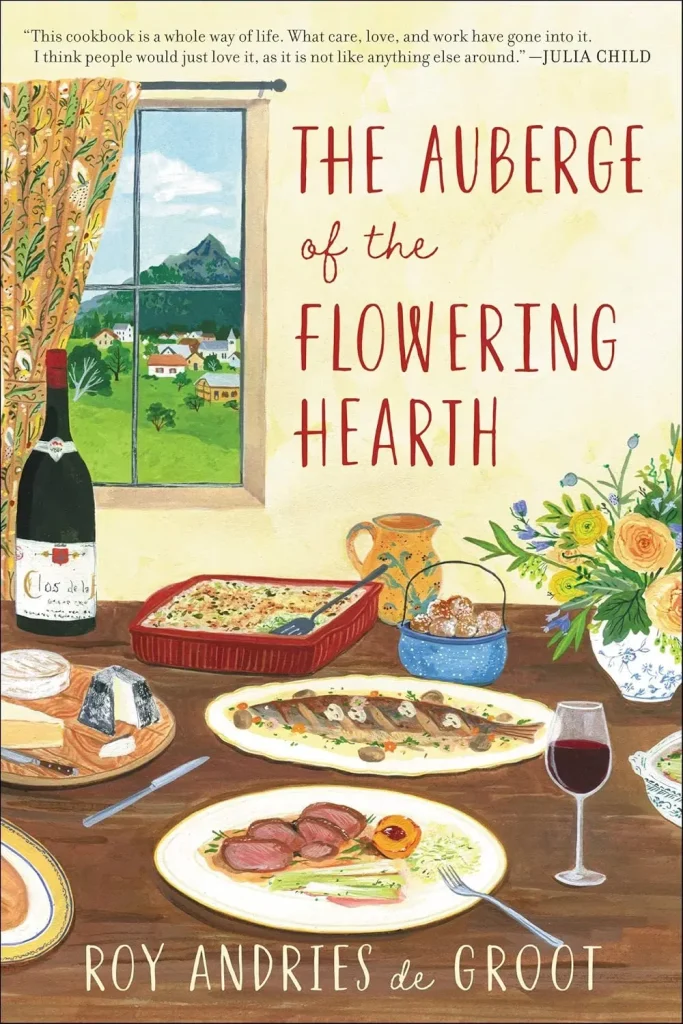Nestled in the world of culinary artistry, “Auberge of the Flowering Hearth” stands as a transformative force, greatly influencing chefs and the landscape of modern cooking. This remarkable literary cookbook not only chronicles the enchantments of French cuisine but also catalyzed a culinary transformation that reverberates to this day. Its profound impact on the farm-to-table movement is a testament to how a narrative can inspire cooks to reconnect with their ingredients and their roots. From iconic chefs such as Alice Waters to Samin Nosrat, many have drawn inspiration from this avant-garde work, demonstrating its pivotal role in reshaping cookbook history. Even as the text dances on the fine line of fiction and reality, the philosophy of sustainable cooking and communal dining it espouses remains a cornerstone of contemporary gastronomy.
In the realm of gastronomic literature, “The Auberge of the Flowering Hearth” emerges as a seminal work that transcends conventional cookbooks. This unique tome, filled with vivid storytelling and culinary philosophy, has left an indelible mark on modern kitchens, fostering a connection between chefs and their locally sourced ingredients, a hallmark of the contemporary culinary landscape. Its influence extends beyond mere recipes, encapsulating a movement that champions the rich narratives behind food and the artistry in preparation. As we explore this literary gem, we uncover its resonance with the ethos of pastoral cooking and the ideals that drive the farm-to-table initiative. By examining its legacy, we see how it not only enriched the experiences of chefs but also contributed significantly to a new chapter in the cookbook genre.
The Influence of ‘Auberge of the Flowering Hearth’ on Modern Cuisine
‘The Auberge of the Flowering Hearth,’ penned by Roy Andries de Groot, has acted as a profound influence on chefs worldwide, particularly at the intersection of culinary innovation and storytelling. This literary cookbook transcends the traditional role of a recipe book, showcasing the art of cooking as a narrative that connects chefs to their ingredients and heritage. It embodies the ethos of the farm-to-table movement, where chefs like Alice Waters embraced practices that emphasize sourcing local ingredients, thus making the cooking process a holistic experience. Not merely a collection of recipes, ‘Auberge’ presents cooking as a means of cultural expression, deeply rooted in the landscapes and communities from which these ingredients are sourced.
Chefs such as Waters and Samin Nosrat have lauded the impact of ‘Auberge’ on their culinary journeys, revealing how its pages inspired them to create meaningful dishes that reflect their own environments. This aligns perfectly with the concept of culinary transformation, as it encourages chefs to delve deeper into ingredient quality and locality. As chefs embrace the literary aspects of cooking, it’s clear that de Groot’s narrative style has influenced how modern cookbooks are crafted, echoing the sentiment that food is more than sustenance—it’s a bridge to history, culture, and the community.
The Literary Evolution of Cookbooks: A Look Back
The evolution of cookbooks into literary works can be traced back to the likes of ‘The Auberge of the Flowering Hearth.’ This shift highlights the importance of narrative in culinary literature, indicating that successful cookbooks go beyond providing recipes to offering readers a journey through vivid descriptions and personal anecdotes. De Groot’s work falls under this category, woven with tales that enrich the cooking experience, thus appealing not just to cooks but also to bibliophiles who appreciate food-related narratives. Literary cookbooks have become an essential genre that captures the passion, philosophy, and lifestyle surrounding food, further igniting the culinary imagination of both chefs and home cooks alike.
Historically, cookbooks have presented mere compilations of recipes focused on technique and ingredient lists. However, the literary approach adopted by de Groot and others has transformed this view, as seen in the structure of cookbooks like Elizabeth David’s ‘A Book of Mediterranean Food.’ Involving storytelling, sensory experiences, and emotional connections, these cookbooks advocate that recipes should provoke an exploration of culinary arts as a profound experience rather than a mechanical task. Through this literary evolution, readers are encouraged not just to cook but to understand and appreciate the deeper cultural significance that food holds in their lives.
The Impact of the Farm-to-Table Movement on Culinary Arts
‘Auberge of the Flowering Hearth’ played a pivotal role in launching the farm-to-table movement, a culinary shift towards sustainability and local sourcing that redefined modern cooking. With a rich narrative showcasing the connection between the land and the plate, de Groot illustrated how food can draw upon local agricultural practices, thereby encouraging cooks to honor their regional heritage. As chefs rediscovered the importance of using seasonal ingredients, this movement revolutionized menus across the nation, driving home the idea that food is most flavorful and meaningful when it reflects its geographical roots.
The authentic dishes conjured in ‘Auberge,’ crafted from local produce and influenced by the natural landscape, sparked a renaissance among chefs who now prioritize sourcing fresh, organic, and locally-sourced ingredients. Chefs like Waters and Nosrat have embraced this ethos, demonstrating that the farm-to-table philosophy is more than just a trend; it’s a fundamental approach that strengthens connections between consumers and local producers, fostering a community of support around sustainable practices. In this way, the spirit of de Groot’s narrative lives on, influencing culinary educators and chefs to inspire future generations to respect and utilize the bounty their regions provide.
Culinary Transformation Through Storytelling
Storytelling is integral to the transformation of contemporary culinary practices, and ‘The Auberge of the Flowering Hearth’ embodies this through its lyrical prose that melds personal experience with gastronomic artistry. De Groot’s ability to evoke senses through vivid descriptions transports readers into the very landscapes and experiences he narrates, allowing them to feel a connection not just to the food being prepared but to the cultural context in which it flourished. This transformative approach to storytelling in culinary literature serves to deepen the appreciation of the cooking experience, encouraging chefs and home cooks to share their own narratives and traditions through food.
As culinary creativity flourishes in restaurants and homes alike, the narrative structure of ‘Auberge’ provides a template for what modern cooks can aspire to achieve. The incorporation of personal stories and experiences that intertwine with culinary techniques enhances the emotional resonance of cooking, leading to a movement where every dish tells a story. Chefs today are increasingly aware of the cultural significance of their recipes, which allows them to celebrate and honor their culinary backgrounds while engaging their audiences at a deeper level. This narrative-driven methodology not only allows cooks to articulate their culinary philosophies but also plays a significant role in the wider acceptance of diverse culinary narratives in mainstream gastronomy.
The Cookbook History and Its Cultural Importance
The history of cookbooks reveals a deep intertwining of culture, society, and personal stories, with ‘Auberge of the Flowering Hearth’ standing out as a key contributor to this narrative. Spearheading the modern evolution of cookbooks, de Groot’s work emphasizes the notion that cookbooks can be vessels for cultural exploration and societal reflection. By placing culinary traditions within the context of personal experience, ‘Auberge’ acts as an artifact that records a unique moment in culinary history, marking a significant shift in how recipes are compiled and presented.
As global cuisines become increasingly disseminated through literature and media, the importance of cookbooks like ‘Auberge’ cannot be overstated. They serve not only as practical guides but as platforms for cultural exchange and understanding. By exploring how culinary practices shape identities and communities, literary cookbooks contribute to ongoing discussions about globalization and localization in the food world. They preserve rich traditions, encourage exploration, and foster appreciation through the written word, inviting readers to engage with food culture in a profound and personal way.
Celebrating Culinary Icons Inspired by ‘Auberge’
Many culinary icons have emerged from the inspiration of ‘The Auberge of the Flowering Hearth,’ shaping contemporary cuisine with their interpretations of de Groot’s philosophy. Through their dedication to honoring local ingredients and fostering relationships with farmers, chefs like Alice Waters have cultivated a movement centered around sustainability and authenticity. Their works reflect a commitment to ensuring that the value of good food extends beyond mere consumption and touches on environmental consciousness and cultural pride.
Individuals like Samin Nosrat have also drawn on de Groot’s writings and ideologies, effectively using the principles espoused in ‘Auberge’ to educate home cooks about balancing flavor while respecting ingredients. Nosrat’s approach, which highlights sourcing locally and cooking mindfully, echoes the sentiments expressed in de Groot’s narratives—showing that culinary efforts resonate deeper than the act of cooking. As chefs continue to honor the traditions invoked through ‘Auberge,’ they create a ripple effect across the culinary world, fostering a renewed appreciation for the connections between land, food, and community.
Exploring the Intersection of Literature and Culinary Arts
The intersection of literature and culinary arts has never been more relevant than in the modern culinary landscape, largely influenced by works like ‘The Auberge of the Flowering Hearth.’ De Groot’s narrative style elevates the experience of cooking beyond practicality, turning it into a form of artistic expression that invites readers to embrace their creativity in the kitchen. This burgeoning field of literary cookbooks encourages aspiring chefs to articulate their emotions and thoughts through the lens of culinary practices, fostering a community that values the stories behind each dish.
Moreover, this intersection promotes a burgeoning curiosity around flavor and technique within a literary context, enabling readers to develop an intrinsic appreciation of food beyond its physical attributes. Chefs today, inspired by de Groot’s pioneering approach, have begun incorporating memoir and narrative elements into their cookbooks, further engaging readers and creating culinary narratives that resonate personally. This blending of storytelling with culinary skill ultimately enriches the reader’s cooking journey, as values, histories, and philosophies around food and culture are shared across generations.
The Legacy of ‘The Auberge of the Flowering Hearth’ in Contemporary Cuisine
‘The Auberge of the Flowering Hearth’ has left an indelible mark on contemporary cuisine, influencing chefs to approach their craft with both heart and narrative. Its legacy endures through the culinary principles it espouses, promoting a relationship with ingredients that honors not just their origin but the stories they hold. This emphasis on storytelling in kitchen practices encourages modern chefs to view their work not just as a job but as an extension of cultural pride, equity, and community engagement – all essential components in today’s culinary climate.
In this era of heightened awareness about ingredient sourcing and sustainability, de Groot’s vision of redefining culinary excellence by intertwining narrative and experience continues to flourish. Chefs take inspiration from his work as they carve out their unique identities in the culinary landscape. The lasting effect of ‘Auberge’ prompts a new generation of chefs to create food that tells their stories, connects their kitchens with local farms, and embraces the multicultural fabric of today’s food scene. Its impact can be seen everywhere from farm stands to fine dining establishments, where chefs uphold the spirit of de Groot’s work while crafting innovative, meaningful culinary experiences.
Frequently Asked Questions
What is the significance of ‘Auberge of the Flowering Hearth’ in culinary transformation?
‘Auberge of the Flowering Hearth’ is renowned for its impactful role in culinary transformation. Through its vivid narrative and emphasis on farm-to-table cooking, it inspired many chefs, including Alice Waters and Samin Nosrat, to embrace locally sourced ingredients and artistic cooking techniques, redefining modern cuisine.
How did ‘Auberge of the Flowering Hearth’ influence chefs and the culinary world?
The cookbook ‘Auberge of the Flowering Hearth’ significantly influenced chefs by shifting culinary paradigms toward a deeper appreciation for the connections between food, culture, and community. Its portrayal of French countryside cooking promoted the values of the farm-to-table movement and inspired chefs to create dishes that nurture both the body and soul.
What are some of the themes explored in ‘Auberge of the Flowering Hearth’?
‘Auberge of the Flowering Hearth’ explores themes of culinary artistry, the importance of seasonal and local ingredients, and the joy of communal dining. It showcases the influence of literary cookbooks that merge storytelling with cooking, inviting readers to immerse themselves in the flavors and traditions of French cuisine.
Can you explain the historical context of the cookbook ‘Auberge of the Flowering Hearth’?
Published in the late 20th century, ‘Auberge of the Flowering Hearth’ emerged during a time when culinary culture was evolving, reflecting a push against processed foods and a return to traditional cooking methods. Its emphasis on fresh, local ingredients resonated with the principles of the farm-to-table movement, making it a pivotal work in culinary history.
What impact did ‘Auberge of the Flowering Hearth’ have on the farm-to-table movement?
‘Auberge of the Flowering Hearth’ played a crucial role in the farm-to-table movement by illustrating how food could connect chefs and diners to their local land and community. By prioritizing local ingredients and seasonal cooking, it galvanized chefs like Alice Waters to enhance the dining experience through sustainable practices.
What literary elements are found in ‘Auberge of the Flowering Hearth’ that enhance its cookery?
‘Auberge of the Flowering Hearth’ combines rich narrative and descriptive prose with culinary instructions, elevating it beyond a mere cookbook. This literary approach invites deeper engagement, transforming recipes into an exploration of culture and environment, which is a hallmark of influential literary cookbooks.
How has ‘Auberge of the Flowering Hearth’ inspired modern culinary practices?
Modern culinary practices have been shaped by ‘Auberge of the Flowering Hearth’ through its advocacy for fresh ingredients and a holistic approach to cooking. Many contemporary chefs cite its influence in exposing them to the values of authenticity, artistry, and sustainability in food preparation.
Is the story behind ‘Auberge of the Flowering Hearth’ based on real experiences or fictional elements?
While ‘Auberge of the Flowering Hearth’ contains fictional elements woven into its narrative, it reflects real experiences and ideals of cooking that resonate with chefs and culinary enthusiasts. The blend of fact and fiction illustrates the aspirational nature of culinary storytelling.
What is the legacy of ‘Auberge of the Flowering Hearth’ in the context of English-language cookbooks?
The legacy of ‘Auberge of the Flowering Hearth’ in the realm of English-language cookbooks is significant, as it helped redefine cookbooks as literary works that encapsulate cultural experiences. Its enduring popularity showcases its role in the evolution of cookbooks from simple recipe collections to celebrated works of art and literature.
| Key Aspect | Details |
|---|---|
| Inspiration for Chefs | The book inspired notable chefs including Alice Waters and Samin Nosrat. |
| Culinary Movement | It contributed to the farm-to-table movement, focusing on local and fresh ingredients. |
| Authors and Contributors | Authored by Roy Andries de Groot, who faced blindness and used his sensory experiences to create the book’s vivid descriptions. |
| Literary Nature | The book is viewed as a literary work rather than just a recipe collection, deeply immersing readers in a culinary philosophy. |
| Cultural Impact | Despite its semi-fictional nature, ‘Auberge’ set a standard for how food and cooking could be connected to culture and identity. |
| Enduring Legacy | The book has not gone out of print for over fifty years, influencing many chefs and food writers. |
Summary
Auberge of the Flowering Hearth remains a seminal work in the culinary world, offering more than just recipes; it presents a vision of cooking that emphasizes connection to the land and community. Through its semi-fictional narratives, Roy Andries de Groot captures the imagination of readers and cooks alike, providing a source of inspiration that transcends generations. Its influential role in igniting the farm-to-table movement demonstrates its lasting relevance, reminding us that even in an era rife with commercialization, there exists a deeper relationship between food, place, and people. Thus, ‘Auberge of the Flowering Hearth’ is not merely a cookbook, but a testament to the transformative power of culinary storytelling.



